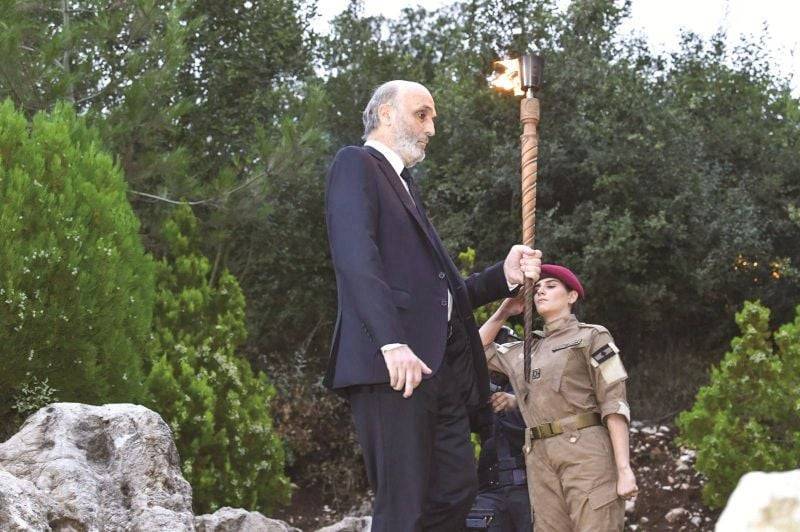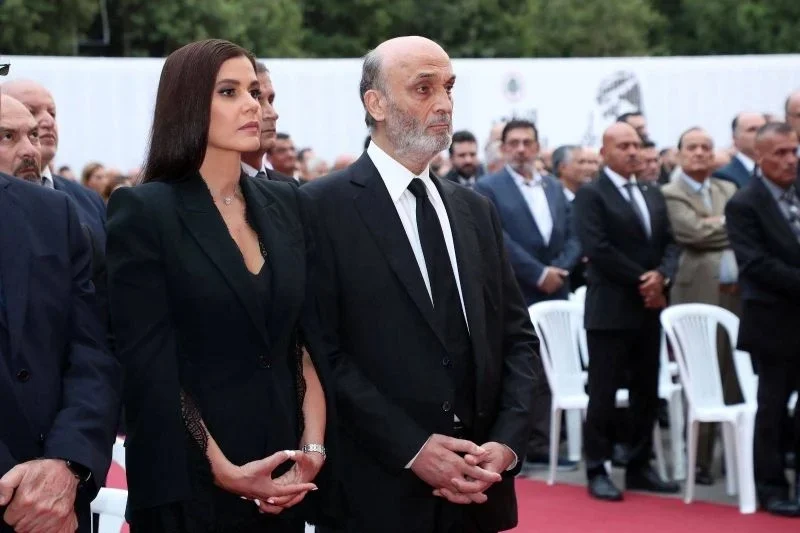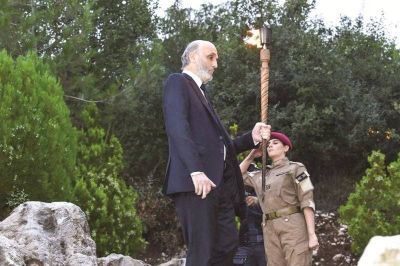
The head of the Lebanese Forces, Samir Geagea, carries a torch during a ceremony on Sunday, Sept. 3, 2023, in Maarab. (Photo taken from the LF website)
On Sunday, after the annual mass held for “martyrs of the resistance,” Lebanese Forces (LF) leader and Saudi Arabia’s main ally in Lebanon Samir Geagea delivered an incendiary speech.
Not only did the Geagea declare an “all-out” confrontation against Hezbollah and its allies, calling them the “axis of crime,” but he went so far as to say that the pro-Iranian party will not “ascend [to the] Baabda [Presidential Palace].
The LF leader also repeatedly referred to former Prime Minister Rafik Hariri, who, before his assassination in 2005, which was blamed on Hezbollah, was Saudi Arabia’s protégé in Lebanon.
Geagea’s remarks came shortly after the visit to Beirut by Iranian Foreign Minister Hossein Amir-Abdollahian. The Iranian senior official used the visit to report “positive signals” on the Lebanese dossier during his recent talks with Saudi officials.
In light of these apparent positive developments, the question arises: Why did Geagea escalate his rhetoric?
Maarab on the defensive
Amir-Abdollahian’s remarks may indeed be a source of hope for Hezbollah’s preferred candidate and Marada leader Sleiman Frangieh, as Riyadh’s greenlight is essential for any candidate hoping to ascend the presidency.
While Riyadh and Tehran recently signed an agreement in Beijing to normalize their diplomatic relations, the two regional rivals are far from having resolved all their differences.
However, Lebanon’s March 8 camp, which is affiliated with Hezbollah, is banking on this rapprochement to ultimately push its agenda in the presidential elections at home.
In the same vein, Geagea’s remarks could be understood as a message to its Saudi ally that his party is not ready to endorse the Frangieh option to support such an option, and that it will strongly oppose it.
“The LF’s intransigent position reflects Samir Geagea’s personal conviction that confrontation is the best way to fight the presidential battle,” said political scientist Karim Bitar. “It’s a message to Riyadh, to remind Saudi decision-makers that their allies in Lebanon would not appreciate a regional de-escalation at the expense of their own interests.”
 Sethrida and Samir Geagea during the mass celebrated for the martyrs of the Lebanese resistance in Maarab, Sept. 3, 2023. (Photo taken from the LF website)
Sethrida and Samir Geagea during the mass celebrated for the martyrs of the Lebanese resistance in Maarab, Sept. 3, 2023. (Photo taken from the LF website)
However, an alternative interpretation suggests that Geagea’s fiery rhetoric might have been inspired by Saudi Arabia, which, while maintaining a low profile in the Lebanese presidential matter, is unwilling to make concessions to Hezbollah.
“Riyadh has no intention of engaging in regional confrontations, let alone in Lebanon,” said a Sunni political figure with close ties to the kingdom, who spoke on condition of anonymity given the sensitivity of the issue. “But this does not imply that they [the Saudis] are considering the Frangieh option.”
The Group of Five (comprising France, the USA, Saudi Arabia, Qatar, and Egypt) convened meetings in Paris and Doha to outline the profile sought of the next head of state, which does not seem to align with Frangieh’s.
“The Saudis are not really interested in the name of a president per se,” said political scientist Khaldoun el-Cherif. “They would resume aid to Lebanon with the election of a president who meets the following three criteria: someone well-versed in economic matters, not corrupted and unaffiliated with any particular faction.”
A counter-proposal
Meanwhile, the LF claims to be on the same wavelength as Saudi Arabia.
“Riyadh’s position is excellent,” said party spokesman Charles Jabbour. “The kingdom is committed to Lebanon’s sovereignty and does not want Hezbollah to consolidate its hold on the country.”
Jabbour added, “If the discourse is aimed at a foreign player, it’s more likely to be France.”
Indeed, relations between Paris and the Lebanese opposition camp have been strained ever since the French proposed a trade-off arrangement, whereby the new president would be aligned with March 8, i.e., Frangieh, and the next prime minister would be aligned with the opposition.
Officially, this option is no longer on the table, but differences persist, particularly since French envoy for Lebanon Jean-Yves Le Drian requested that parliamentary bloc leaders specify in writing the ideal profile of a new president in preparation for a national dialogue.
The move was boycotted by the LF and other opposition groups, who denounced it as a political misstep on the part of the French, arguing that the priority should be the election of a president.
At the end of August, 31 opposition MPs signed a statement in which they expressed their rejection of Le Drian's questionnaire, emphasizing the importance of respecting the democratic and constitutional procedures.
By the same token, the opposition groups rejected the recent initiative by Parliament Speaker Nabih Berri, who called for holding open electoral sessions until a new head of state is elected on the condition that these be preceded by an extensive seven-day dialogue gathering the leaders of the various parliamentary blocs.
“They [the mumanaa (resistance camp] lure you into dialogue for months, only to kill you if you do not comply with their demands,” Geagea said on Sunday.
In an attempt to break the deadlock, Koura MP Adib Abdel Massih, who is close to Michel Moawad’s Independence Movement, put forward a counter-proposal.
“It consists of holding open electoral sessions, between which bilateral dialogues will take place,” he told L’Orient-Le Jour, claiming to have begun discussions with the various political blocs.
“I’m a moderate opponent, and I’m trying to find a middle way forward,” Abdel Massih added. “So I’m going to meet the speaker on Wednesday to explain my idea to him,” — a remark that seems not totally in line with the Moawad’s Renewal Bloc, which has positioned itself in direct opposition to Hezbollah.
“This will be a stillborn initiative,” said a leading opposition figure on condition of anonymity. “Nabih Berri is not to be trusted.”
The LF is surprisingly open to the idea.
“Abdel Massih’s proposal allows us to find a way out of the crisis while respecting the constitution,” Jabbour said. “The constitution calls for the election of a president inside Parliament and not at a dialogue table behind closed doors.”
This article was originally published in French in L'Orient-Le Jour. Translation by Sahar Ghoussoub.
